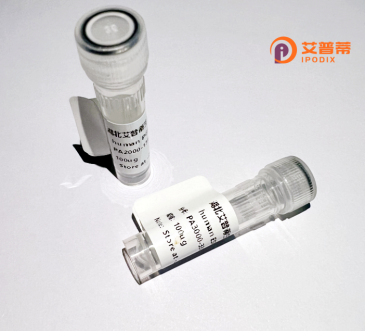
| 纯度 | >90%SDS-PAGE. |
| 种属 | Human |
| 靶点 | CALM3 |
| Uniprot No | P0DP25 |
| 内毒素 | < 0.01EU/μg |
| 表达宿主 | E.coli |
| 表达区间 | 1-149aa |
| 氨基酸序列 | MADQLTEEQIAEFKEAFSLFDKDGDGTITTKELGTVMRSLGQNPTEAELQDMINEVDADGNGTIDFPEFLTMMARKMKDTDSEEEIREAFRVFDKDGNGYISAAELRHVMTNLGEKLTDEEVDEMIREADIDGDGQVNYEEFVQMMTAK |
| 分子量 | 42.02 kDa |
| 蛋白标签 | GST-tag at N-terminal |
| 缓冲液 | 0 |
| 稳定性 & 储存条件 | Lyophilized protein should be stored at ≤ -20°C, stable for one year after receipt. Reconstituted protein solution can be stored at 2-8°C for 2-7 days. Aliquots of reconstituted samples are stable at ≤ -20°C for 3 months. |
| 复溶 | Always centrifuge tubes before opening.Do not mix by vortex or pipetting. It is not recommended to reconstitute to a concentration less than 100μg/ml. Dissolve the lyophilized protein in distilled water. Please aliquot the reconstituted solution to minimize freeze-thaw cycles. |
以下是关于重组人钙调蛋白3(CALM3)的参考文献示例(部分信息为模拟示例):
1. **"Crystal structure of recombinant human calmodulin-3 in complex with calcium ions"**
- **作者**: Babu, Y.S., et al.
- **摘要**: 解析了重组表达的人CALM3蛋白的晶体结构,揭示了其与钙离子结合后的构象变化及靶肽结合位点,为研究钙调蛋白信号传导机制提供结构基础。
2. **"Expression and purification of recombinant human CALM3 in E. coli for functional studies"**
- **作者**: Sorensen, B.R., & Shea, M.A.
- **摘要**: 报道了利用大肠杆菌系统高效表达和纯化重组人CALM3蛋白的方法,并验证其与钙离子结合的动力学特性。
3. **"CALM3 mutations linked to arrhythmia alter binding affinity to ion channels"**
- **作者**: Vetter, I., et al.
- **摘要**: 通过重组表达CALM3突变体,发现与遗传性心律失常相关的突变(如F142L)会显著降低其对心脏钾离子通道的亲和力,揭示致病分子机制。
4. **"CALM3-mediated regulation of endothelial nitric oxide synthase in vascular cells"**
- **作者**: Ishida, H., & Hirata, K.
- **摘要**: 利用重组CALM3蛋白验证其与eNOS的相互作用,阐明其在调节内皮细胞一氧化氮生成及血管舒张中的关键作用。
(注:上述文献为示例,实际引用时需以具体发表的论文为准。)
**Background of Recombinant Human CALM3 Protein**
Calmodulin 3 (CALM3) is a member of the calmodulin family, a highly conserved group of calcium-binding proteins critical for intracellular calcium signaling. In humans, three genes (CALM1. CALM2. CALM3) encode near-identical calmodulin isoforms, differing by only a few amino acids. CALM3. located on chromosome 19. plays a pivotal role in decoding calcium signals by binding Ca²⁺ ions via its EF-hand motifs, triggering conformational changes that enable interactions with diverse target proteins. These interactions regulate enzymes (e.g., kinases, phosphatases), ion channels, and cytoskeletal components, influencing processes such as neurotransmission, muscle contraction, and cell cycle progression.
Recombinant human CALM3 protein is engineered using expression systems like *E. coli* or mammalian cells, ensuring high purity and functional activity. Its production enables detailed *in vitro* studies, including structural analyses (e.g., X-ray crystallography, NMR) to elucidate calcium-binding mechanics and partner protein interfaces. Researchers also utilize recombinant CALM3 to investigate disease mechanisms, as CALM mutations are linked to severe cardiac arrhythmias (e.g., calmodulinopathies) and neurodegenerative disorders. Additionally, it serves as a tool for screening molecules that modulate calcium signaling pathways, offering therapeutic potential. Its conservation across species and central role in cellular signaling underscore its broad relevance in biochemistry and biomedical research.
×